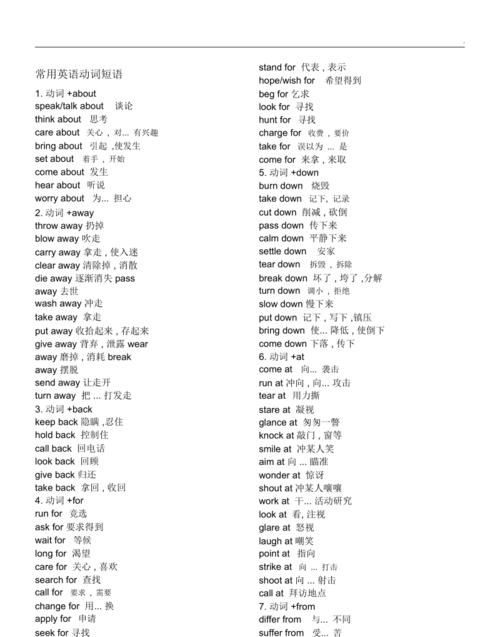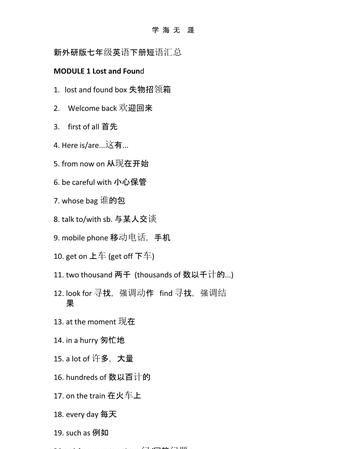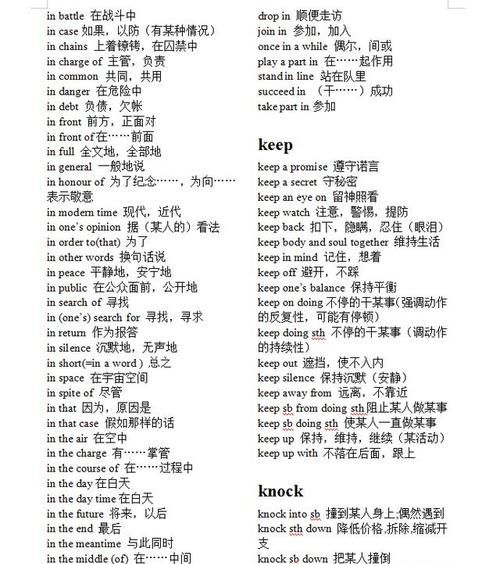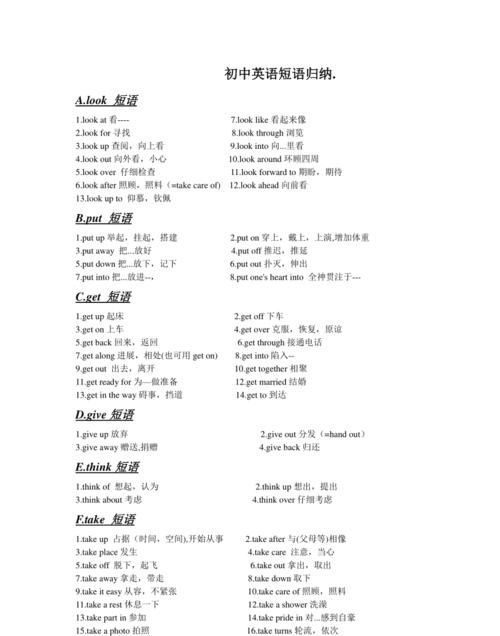本文目录
初一英语所有固定搭配
1.How+adj.+(主+谓)!
What+(a/an)+n.(复)!
例:What beautiful flowers in the garden they are!
How beautiful the flowers in the garden are!
2.画线提问
(1)画的是adj,则用How作疑问词
(2)画的是n,则用What作疑问词
(3)画的是one,twenty,a hundred…则用How many作疑问词
(4)画的是time,则用When作疑问词
(5)画的是place,则用Where作疑问词
(6)画的是twice,three times a year,once a day…则用How often作疑问词
3.变换时态
过去----现在
现在----将来
将来----过去
4.两句并一句
例:I didn't have breakfast. I went to school.
变为:I went to school without having breakfast.
5.同义句转换
(1)not anything else = nothing else
(2)be not the same as = be different from
(3)also = too(句末) = as well
(4)look after…well = take good care of…
(5)by Oneself= alOne= on one's own
6.祈使句
例:Be late.
Don't be late.
7.反义疑问句
短语:
read comics
a wooden house
chat with sb.
climb a ladder
bunk beds
share sth with sb.
hold on
at least
air pollution
be close to
never mind
Beijing Opera
have a good time
show sb. around…
instead of
be surprised to do sth./at sth./+句子
jump out of
turn around
say to oneself(自言自语)
return sth. to…
take turn to do sth.
belong to sb.
happen to sb.
stay on the sea bed
这是百度前辈留下的,个人觉得很全,可以试试看~

初一英语固定搭配短语大全
enjoy doing sth 享受或喜欢做某事
I enjoy driving.我喜欢开车。
Different people enjoy doing different things.不同的人喜欢做不同的事。
be busy doing sth 忙于做某事
I am busy doing my homework right now. 我现在正在忙着做作业。
They are busy going to school. 他们赶着上学。
It`s+adj +to do sth . 做什么事情是.....的
It's hard to get up early. 起早床是一件难事。
It's very hard to do everything very well.把所有事情都做得很好是很难的
try doing 试着做某事
I try doing more exercise.我试着多做运动。
I try washing my clothes.我试着洗自己的衣服。
ask sb.to do 叫某人做某事
The teacher asks me to answer the question. 老师叫我回答这个问题。
I ask my mother to buy me a toy.我叫妈妈给我买一个玩具。
forget doing 忘记已经做过的事
I forget doing homework this morning.我忘记今天早上做过作业了。
forget to do 忘记要去做某事
Sorry, Miss Zhang I just forget to do my homework.对不起,张老师,我只是忘记要做功课了。
remember to do 记得要做某事(还没做过)
I remember to watch this movie.我记得要去看这部电影。
I remember to play basketball with my friends.我记得要去和我的朋友们一起打篮球。
remember doing 记得做过的事
I remember watching this movie.我记得看过这部电影。
I remember playing basketball with my friends.我记得和我的朋友们一起打过篮球。
let sb do 让某人做某事
Let me help you,please.请让我帮你吧。
Let us go to school.让我们去上学吧。
make sb do 使某人做某事
He makes she cry. 他把她弄哭了。
The poor marks(成绩不好)makes me feel unhappy. 成绩不好让我很不开心。
like doing sth 喜欢做某事(习惯上的)
I like watching TV. 我喜欢看电视。
I like playing games with my friends.我喜欢和我的朋友玩游戏。
start to do sth 开始去做某事
I start to do my homework. 我开始做我的家庭作业。
I start to go shopping.我开始去购物。
start doing sth 开始做某事
I start reading a story book.我开始阅读一本故事书。
I start cleaning our classroom.我开始打扫教室。
finish doing sth 完成....
I finish doing my homework.我完成作业了。
She finishes singing the song.她唱完这首歌了。
(一般现在时态)be doing 正在做...
I am sleeping.我正睡觉。
They are playing football.他们正在踢足球。
would like to do (表示意愿)
I would like to help you with your study.让我在学习上帮帮你吧。
She would like to go the cinema on weekend. 她想在周末去看电影。
spend......(in) doing sth 花费....做...
You spend much time in watching T.V..你花太多时间看电视了。
I spend all my money buying this book.我把我的钱都花在买这本书上了。
look forward to doing sth 期待做某事
I look forward to growing up quickly.我想快快长大。
They look forward to knowing the results of the examination.他们盼着知道考试的成绩。
want to do sth 想要做某事
I want to fly in the air. 我想在天上飞。
I want to study English.我想学习英语。
decide to do sth 决定...
I decide to do some housework. 我决定做一些家务事。
She decides to wash clothes.她决定洗衣服。
It takes sb sometime to do sth 花费某人多少时间做...
It takes me a long time to learn how to ride a bike. 我花了很长时间学会骑自行车。
It takes he sometime to answer the question.他花了一些时间来回答这个问题。
be going to do sth/will do(一般将来时态)将要做某事
I am going to play games with my friends.我将要和我们朋友一起玩游戏。
They are planning to hold a party for her birthday. 他们打算将为她的生日举行一个聚会。
Thank for doing sth 感谢做某事
Thank for answer my question. 谢谢你回答我的问题。
Thank for helping me with my English study.谢谢你帮我学习英语。
in English用英语
I can speak in English. 我会讲英语。


初中英语常见固定搭配短语大全
一. 词汇
⑴ 单词
1. 介词:in, on, under, behind, near, at, of
1). in表示"在……中", "在……内"。例如:
in our class 在我们班上
in my bag 在我的书包里
in the desk 在桌子里
in the classroom 在教室里
2). on 表示"在……上"。例如:
on the wall 在墙上
on the desk 在桌子上
on the blackboard 在黑板上
3). under表示"在……下"。例如:
under the tree 在树下
under the chair 在椅子下
under the bed 在床下
4). behind表示"在……后面"。例如:
behind the door 在门后
behind the tree 在树后
5). near表示"在……附近"。例如:
near the teacher's desk 在讲桌附近
near the bed 在床附近
6). at表示"在……处"。例如:
at school 在学校
at home 在家
at the door 在门口
7). of 表示"……的"。例如:
a picture of our classroom 我们教室的一幅画
a map of China 一张中国地图
2. 冠词 a / an / the:
冠词一般位于所限定的名词前,用来署名名词所指的人或事物。冠词有不定冠词和定冠词两种。不定冠词有两个形式,即a和an。a用在以辅音音素开头的词前,如a book; an用在以元音音素开头的字母前,如an apple.
a或an与可数名词单数连用,泛指某类人或某物中的一个。
This is a cat.
这是一只猫。
It's an English book.
这是一本英语书。
His father is a worker.
他的爸爸是个工人。
the既可以用在可数名词前,也可以用在不可数名词前,表示某个或某些特定的人或事物,也可以指上文提到过的人或事物。
Who's the boy in the hat?
戴帽子的男孩是谁呀?
------ What can you see in the classroom?
------ I can see a bag.
------ Where's the bag?
------ It's on the desk.
------- 你能在教室里看到什么呀?
------ 我能看见一个书包。
------ 书包在哪呀?
------ 在桌子上。
3.some和any
①在肯定句中用some.例如:
There are some books on the desk.桌子上有一些书。
Lucy has some good books露西有一些好书。
②在疑问句和否定句中用any。例如:
Is there any ink in your pen?你的钢笔里有墨水吗?
Do you have any brothers and sisters?你有兄弟姐妹吗?
There isn't any water in the glass.杯子里没有水。
⑵记住它们的特殊用法。
①some亦可用于表示盼望得到对方肯定的答复或表示建议、委婉请求的疑问句中,这一点我们不久就会学到。例如:
Would you like to have some apples?你想吃苹果吗?
②any也可用于肯定句中,表示"任何的"。例如:
Any one of us can do this.我们当中任何一个都能做这个。
some 和any的用法是经常出现的考点,希望大家能准确地掌握它们的用法。
4.family
family看作为一个整体时,意思是"家庭",后面的谓语动词be用单数形式 is ;如把family看作为家庭成员时,应理解为复数,后面的谓语动词be应用are。
My family is a big family. 我的家庭是个大家庭。
My family are all at home now. 我的家人现在都在家。
Family强调由家人组成的一个集体或强调这个集体中的成员。home指个人出生、被抚养长大的环境和居住地点。 house指"家"、"房屋",侧重居住的建筑本身。
His family are all workers. 他的家人都是工人。
My home is in Beijing. 我的家在北京。
He isn't at home now. 他现在不在家。
It's a picture of my family. 这是一张我全家的照片。
5. little的用法
a little dog 一只小狗,a little boy 一个小男孩。little常用来修饰有生命的名词。
*但little还可表示否定意义,意为"少的",加不可数名词。
There is little time. 几乎没时间了。
There is little water in the cup. 杯中水很少。
⑵ 词组
on the desk 在桌子上
behind the chair 在椅子后
under the chair 在椅子下面
in her pencil-box 在她的铅笔盒中
near the door 在门附近
a picture of a classroom 一个教室的图片
look at the picture 看这张图片
the teacher's desk 讲桌
a map of China 一张中国地图
family tree 家谱
have a seat 坐下,就坐
this way 这边走
二. 日常用语
1. Come and meet my family.
2. Go and see. I think it's Li Lei.
3. Glad to meet you.
4. What can you see in the picture?
I can see a clock / some books.
5. Can you see an orange?
Yes, I can. / No, I can't.
6. Where's Shenzhen?
It's near Hong Kong.
7. Let me see.(口语)让我想想看。
see 在这是"明白、懂了",不可译作"看见"。例如:
8. Please have a seat.
seat表示"座位",是个名词。have a seat表示"就坐",也可以说take a seat, 和sit down的意思相同。
三. 语法
1. 名词所有格
名词如要表示与后面名词的所有关系,通常用名词所有格的形式,意为"……的"。一般有以下几种形式:
(1). 一般情况下在词尾加"'s"。例如:
Kate's father Kate的爸爸
my mother's friend 我妈妈的朋友
(2). 如果复数名词以s结尾,只加"'"。例如:
Teachers' Day 教师节
The boys' game 男孩们的游戏
(3). 如果复数名词不以s结尾,仍加"'s"。例如:
Children's Day 儿童节
Women's Day 妇女节
(4). 表示两个或几个共有时,所有格应加在后一个名词上。例如:
Lucy and Lily's room Lucy 和Lily的房间
Kate and Jim's father Kate 和Jim的爸爸
动物和无生命事物的名词的所有格一般不在词尾加"'s",而常常用介词of的短语来表示。
a map of China 一幅中国地图
the name of her cat 她的猫的名字
a picture of my family 我的家庭的一张照片
the door of the bedroom 卧室的门
2. 祈使句
祈使句主要用来表示说话人的请求、命令、建议、叮嘱等意图。祈使句一般不用主语,读时用降调。为使语气委婉、礼貌,常在句首或句尾加please 。在句尾时,please前多用逗号。
(1). 祈使句肯定形式的谓语动词一律用动词原形。
Go and see. 去看看。
Come in, please. 请进。
(2). 祈使句的否定形式常用don't于句首。
Don't look at your books. 不要看书。
Don't play on the road. 不要在马路上玩。
3. There be 的句子结构
There be是一个"存在"句型,表示"有"的意思,
肯定句的形式为:There be + 名词(单数或复数)+地点状语或时间状语。
be动词单复数的确定,看be后边第一个名词,当所接主语为单数或不可数名词时,be动词形式为is;当所接主语为复数名词时,be动词为are;当be动词后接两个以上主语时,be动词与最临近主语保持数上的一致。意思为"某地有某人或某物"。如:
There is an eraser and two pens on the desk. 桌子上有一块橡皮和两支钢笔。
There are two pens and an eraser on the desk. 桌上有两支钢笔和一块橡皮。
(1)there be的否定句,即在be的后面加上not。
否定形式为:There be + not + (any) + 名词+地点状语。
There is not any cat in the room. 房间里没猫。
There aren't any books on the desk. 桌子上没书。
(2)there be句型的疑问句就是将be提到句首:Be there + (any) +名词+地点状语?肯定回答:Yes, there is / are. 否定回答:No, there isn't / aren't.
---Is there a dog in the picture? 画上有一只狗吗?
---Yes, there is. 有。
---Are there any boats in the river? 河里有船吗?
---No, there aren't. 没有。
(3)特殊疑问句:How many . . . are there (+地点状语)?"某地有多少人或物?"回答用There be . . .
There's one. / There are two / three / some . . .
有时直接就用数字来回答。One. / Two . . .
---How many students are there in the classroom? 教室里有多少学生?
---There's only one. / There are nine. 只有一个。/有九个。
(4)如果名词是不可数名词,用:How much + 不可数名词 + is there + 地点状语?
How much water is there in the cup? 杯中有多少水?
How much food is there in the bowl? 碗里有多少食物?
001. a bottle/glass/cup… of 一瓶/茶杯/玻璃杯
002. a few 一些
003. a kind of 一种;一类
004. a little 一点;少量
005. a lot of…(lots of…) 许多的
006. a moment later 片刻之后
007. a number of 若干的;许多的
008. a pair of 一双;一副
009. a piece of 一块(张;片;只)
010. all day(long) 整天;一天到晚
011. all kinds of 各种各样
012. all one’s life 一生;终生
013. all over 到处;结束
014. all over the world 全世界
015. all right 行了;好吧;(病)好了
016. all the same 仍然
017. all the time ①一直;始终②老是(美国英语)
018. arrive at/in 到达某地
019. as…as… 一样
020. as…as one can(=as…as possible) 尽量
021. as soon as 一就
022. at breakfast 早餐时
023. at first 起先;开始的时候
024. at home 在家
025. at last 最后;终于
026. at night 在夜里
027. at noon 在正午
028. at once 立刻;马上
029. at school 在学校上课
030. at the back of 在……的后面
031. at the head of 在……的前面
032. at the moment 此刻
033. at the same time 同时
034. at this time of (the) year 在(一年中)这个时节里
035. at times 时常;有时
036. at work 在工作
037. be able to do sth. (= can+V.) 能够
038. be angry with sb. 生某人的起 be angry at/about sth. 生某事的气
039. be born 出生
040. be different from… 和……不同
041. be full of 充满着……
042. be good at 善于 be bad at拙于
043. be good for 对……有益的 be bad for 对……有害的
044. be in hospital 生病;住院 be in the hospital 在医院
045. be late for 迟到
046. be like 像
047. be made of (be made from) ……制的;用…….制成的
048. be/get ready 准备好
049. be sure 肯定;确定
050. break down ①(机械)损坏②拆散(某物)
051. by+交通工具 搭乘某交通工具
052. by the way 顺便一提
053. by then 到那时
054. catch (a) cold; have a cold 感冒
055. change one’s mind 改变想法(注意)
056. come back 回来
057. come down 下来
058. come from ①出生于②来自于
059. come in 进入;进来come out 出来
060. come over 过来;顺便来访
061. come around (走)过来(绕行而来)
062. day after day 日复一日地;天天
063. do(es) +V.ing 做某事
064. do sport 运动;参加(体育)运动
065. does well ①做得很好②成功③成绩很好
066. each other 互相
067. eat up 吃完
068. either…or… 不是……就是
069. enjoy oneself 过得愉快
070. fall behind 落后;跟不上
071. fall off ①跌落;掉下②(质或量)下降
072. far away 遥远
073. feel like doing sth. 想要做某事
074. feel tired 感到疲劳
075. find out 查明;发现;了解
076. from now on 从今以后;今后
077. from … to … 从……到……
078. get back ①返回②取回
079. get down ①下来;落下②记下来
080. get dressed 穿衣服
081. get home 大家
082. get into ①进入②搭乘(出租车)③陷入(坏的情况)
083. get off ①下车②起飞
084. get on ①上车②生活
085. get on (with…)= get along (with…) ①生活②与(某人)相处③(活动)有进展
086. get out of ①从......出来②从出租车(轿车)下来
087. get ready to do sth. 准备做某事
088. get up ①起床②起立
089. get warm (long) 变暖和(长)
090. give a call 给……打电话
091. give back 归还;送回
092. go back 回去
093. go for a walk 散步
094. go home 回家
095. go on 继续
096. go shopping 去购物
097. go to bed 睡觉(并未入睡)
098. go to school 上学
099. go to sleep 入睡;睡着
100. go to the cinema 看电影
101. grow up 成年;长大成人
102. half an hour 半小时
103. have a drink of 喝一点……
104. have good time 玩得很高兴;过得愉快
105. have a look (at) 看一看
106. have a match 比赛have a test 测验
107. have a meeting 开会
108. have a rest 休息
109. have a swim 游泳
110. have a talk 谈话
111. have a walk 散步
112. have a wash 洗(手,脸等)
113. have breakfast 吃早饭
114. have lessons/classes 上课
115. have lunch 吃午饭
116. have sport 进行体育活动
117. have supper 吃晚饭
118. have to 不得不;必须
119. hear from+sb. 收到某人的来信
120. hear of 听说
121. help sb. with sth 在某事上帮某人help sb. (to) do sth. 帮助某人做某事
122. hold a meeting (= have a meeting) 举行会议
123. hold on ①等一等(别挂电话)②坚持;持续
124. hour after hour 一小时又一小时地;持续地
125. how long ①(时间)多长;多长②(长度)多长
126. how many/much 多少/多少(钱)
127. how often 多久;多常
128. how old 几岁;多大(年纪)
129. hundreds of 数百
130. hurry of 匆匆离去;赶快去
131. hurry up 赶快
132. in a minute 一会儿;立刻
133. in bed 躺在床上
134. in English 用英语(说)
135. in front 在前方(面);在正对面
136. in front of 在......前面
137. in time 正好;及时
138. in the middle of 在……中间
139. jump into 跳进……
140. just a moment 等一会儿
141. just then 正在那时
142. keep busy (一直)忙碌
143. last year 去年
144. later on 过后;以后
145. laugh at 嘲笑
146. listen to 听……(讲话)
147. look after 照料;照顾
148. look at (注视着)看;观看
149. look for 寻找
150. look into 往……里看
151. look like 看起来像
152. look over (医生)检查
153. look the same 看起来很像
154. lots of 许多;很多;大量
155. make friends with 与……交朋友
156. make sure 务必
157. middle school 中学
158. move away 搬开;搬走
159. move to 搬到
160. neither… nor… 既不……也不
161. never mind 不要紧;没关系
162. next time 下次
163. no longer (=not…any longer) 不再
164. not … at all 一点也不;根本不(用来加强not的语气)
165. not at all 不用谢;别客气
166. not so … as 不像;不如
167. on foot 走路;步行
168. on show 展览;被陈列着
169. on the earth 在地球上
170. on the (one’s) way 在途中;在路上
171. on time 按时;准时
172. out of 在……之外;从……里头
173. over there 在那边;在对面
174. Party member 共产党员
175. pass on 传递
176. pay for付钱;支付;付出代价
177. play with 玩耍
178. post office 邮局
179. pull out of 把……从……拉出来
180. pull …up from 把……从……拉上来
181. put on 穿;戴上;上演
182. right away 立刻;马上
183. right now 现在;刚刚
184. send away 撵走;开除;解雇
185. send up 发射
186. sit down 坐下
187. so …that 如此……以致……
188. speak to sb. 与……佳话
189. spend some time on 在……花时间
190. stop sb. from doing sth. 阻止某人做某事
191. take a rest 休息
192. take a walk 散步
193. take away 拿走
194. take down 取下
195. take exercise 锻炼(身体)
196. take off 脱掉衣物
197. take one’s time ①不急;慢慢干②用去(某人)时间
198. take part in 参加
199. take/have some medicine 服药
200. take the train/a boat/a bus…坐火车/船/公共汽车……
201. talk about 谈论
202. talk to 与……谈话
203. teach oneself 自学
204. tell (sb.) about 告诉(某人)……
205. the other(s) 另一个(其他的)
206. think about 考虑(是否去做)
207. too …to 太……不能……
208. try on 试穿;试试看
209. turn green 变绿
210. turn off 关掉(自来水,电灯,收音机等)
211. turn on 开;旋开(电灯,无线电等)
212. up and down 上上下下;来回地
213. very much 很;非常
214. wait for 等候;等待
215. wear out 穿坏;穿旧;用尽
216. with one’s help 在(某人)帮助下
217. work on ①从事……工作②继续工作③研究
218. worry about 担心;着急
219. write down 写下;记下

以上就是关于七年级英语固定搭配短语大全 ,初一英语所有固定搭配的全部内容,以及七年级英语固定搭配短语大全 的相关内容,希望能够帮到您。
